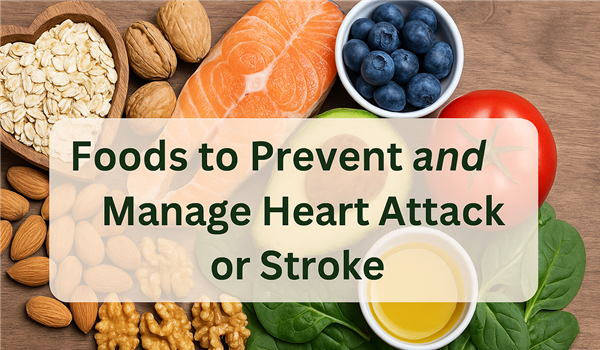Heart Health Diet Prevent Stroke

Patient Information Leaflet: Foods for Heart and Brain Recovery After a Heart Attack or Stroke
Kensington Medical Centre – Belfast
⸻
Why Diet Matters After a Heart Attack or Stroke
If you’ve had a myocardial infarction (heart attack) or stroke, eating a heart-healthy diet is one of the most important steps you can take to recover and reduce your risk of another event. The right foods support your blood vessels, lower cholesterol, manage blood pressure, and reduce inflammation.
⸻
Goals of a Heart-Healthy Diet
• Lower blood pressure and cholesterol
• Maintain a healthy weight
• Improve blood flow
• Prevent blood clots
• Support recovery and long-term health
⸻
Foods That Support Heart and Brain Health
1. Oily Fish
Rich in omega-3 fats that reduce inflammation and support blood vessel health.
Examples: salmon, mackerel, sardines, anchovies, herring (aim for 1–2 portions a week)
2. Fruits and Vegetables
Packed with antioxidants, potassium, and fibre.
Examples: berries, oranges, apples, spinach, broccoli, carrots (aim for 5 portions daily)
3. Wholegrains
Help reduce cholesterol and keep your arteries healthy.
Examples: oats, brown rice, wholegrain bread, barley
4. Legumes and Pulses
High in protein and fibre, low in fat.
Examples: lentils, chickpeas, black beans, kidney beans
5. Healthy Fats
Support blood vessel health.
Examples: olive oil, nuts (almonds, walnuts), seeds (flax, chia), avocado
6. Low-Fat Dairy
Good source of calcium and protein without added saturated fat.
Examples: skimmed milk, low-fat yoghurt, reduced-fat cheese
7. Herbs and Spices
Add flavour without salt.
Examples: garlic, turmeric, basil, parsley, lemon juice
⸻
Foods to Limit or Avoid
• Salt: Too much salt raises blood pressure. Limit to under 6g per day (1 teaspoon).
• Saturated Fats: Found in butter, cream, fatty meats, and some baked goods – choose lean cuts and low-fat options.
• Trans Fats: Found in some processed and fried foods – check food labels and avoid hydrogenated oils.
• Sugary Foods and Drinks: Can contribute to weight gain and diabetes risk.
• Alcohol: Limit to no more than 14 units per week, spread over several days.
⸻
Helpful Tips
• Eat smaller portions and avoid large, heavy meals
• Read food labels to check for salt, fat, and sugar
• Cook at home more often so you control the ingredients
• Choose grilled, baked, or steamed foods instead of fried
• Stay hydrated – aim for 6–8 glasses of water per day
• Try the Mediterranean-style diet, which is shown to protect heart and brain health
⸻
When to See a Doctor
Speak to your GP or nurse if you:
• Have questions about what to eat after a heart attack or stroke
• Need help managing your weight or blood pressure
• Take medications that affect appetite or digestion
• Want advice on supplements or heart-healthy meal planning
A referral to a dietitian or cardiac rehab programme may be recommended.
⸻
For more information, visit www.nhs.uk/conditions/heart-attack/recovery or www.nhs.uk/conditions/stroke/recovery
This leaflet is for general information only. Please speak to your healthcare provider for advice specific to you.
Medical Disclaimer
The dietary advice and information provided in this leaflet are for general guidance and educational purposes only. They are not intended to replace personalised advice, diagnosis, or treatment from a qualified healthcare professional.
If you have a medical condition, are taking medication, are pregnant or breastfeeding, or have specific dietary needs or food allergies, you should consult your GP, dietitian, or another healthcare provider before making significant changes to your diet.
Following general dietary recommendations without proper medical supervision may not be suitable for everyone and could result in unintended health effects. Always seek individualised medical advice for your personal health circumstances.
Page created: 01 June 2025